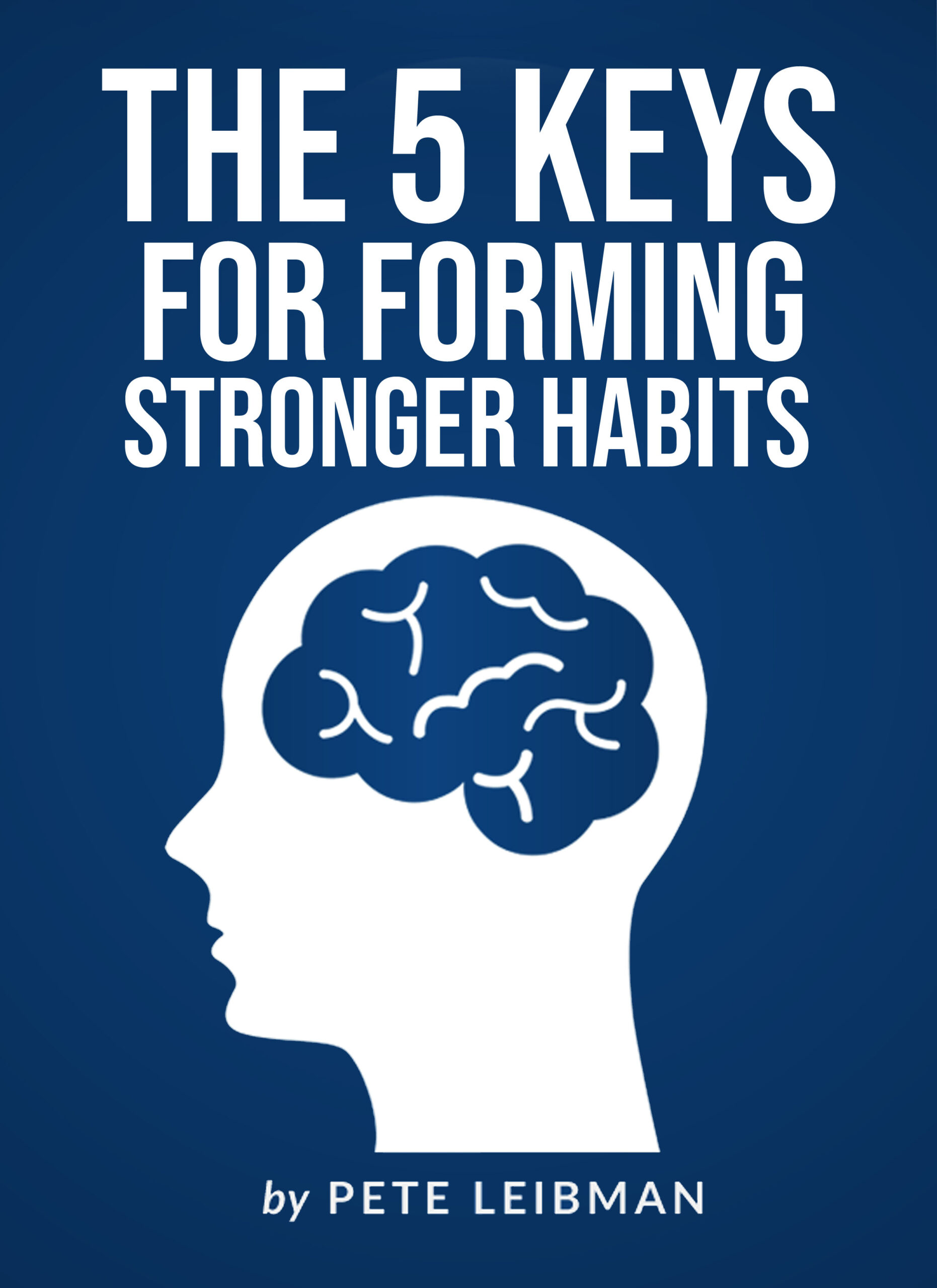
Have you ever wondered how some people resist temptations more than others? In this article, you’ll learn one of their secrets. They use something that I refer to as The Iceberg Rule.
The Iceberg Rule
One of the leaders who I interviewed for my book Work Stronger is Dr. Larry Senn. He is the octogenarian chairman at Senn Delaney, a global culture-shaping firm that has worked with over one hundred Fortune 500 CEOs and their teams.
Many people over the age of eighty are battling major medical issues like dementia or heart disease. However, Larry continues to flourish, and he does not plan on slowing down any time soon. He still works full-time, and he recently authored The Mood Elevator: Take Charge of Your Feelings, Become a Better You. Outside of work, he competes in triathlons, and he also participates in action sports like jet skiing and zip-lining with his family. (Last time I checked, Larry also has the highest score ever recorded on The Stronger Habits Assessment that you can take for free here.)
During my interview with Larry, he shared some thoughts with me about what goes through his mind when he sees a cookie. (Note: I didn’t ask Larry what he thinks when he sees a cookie. He simply shared this example with me when discussing his mindset.)
“When I see a cookie, I see my son Logan’s face on it, and I don’t eat it,” he told me.
Compare that thought with the typical thoughts that most people have when they see a cookie. Most people think about how great the cookie would taste.
Larry thinks differently than most people. He is not focused on what he would gain in the short-term by indulging: brief pleasure for his taste buds. He is focused on what he believes he would lose in the long-term by indulging: time with his son.
Larry doesn’t just see what’s obvious. He also sees the hidden consequences of his actions. He’s very mindful of something that I refer to as The Iceberg Rule. This rule states that every behavior provides immediate benefits or consequences, in addition to delayed benefits or consequences.
Just like an iceberg has ice below the surface (regardless of whether or not you see it), every behavior has delayed consequences or benefits below the surface (regardless of whether or not you see them). For example:
- Sugary treats taste good in the short-term. That’s the immediate payoff. However, sugary treats also make your body and brain weaker. That’s the delayed consequence.
- Watching late-night television is fun in the short-term. That’s the immediate payoff. However, watching late-night television also reduces your sleep quality and decreases your natural energy the next day. That’s the delayed consequence.
- Surfing the internet at work is enjoyable in the short-term. That’s the immediate payoff. However, surfing the internet at work also reduces your productivity. That’s the delayed consequence.
Backed Up By Science
If you think only about immediate payoffs and what’s above the surface, you will be more likely to give in to temptations. In comparison, if you think about delayed consequences and what’s below the surface, you will be less likely to give in to temptations. Scientific experiments have demonstrated this as well.
For example, in a study led by Dr. Hedy Kober, heavy cigarette smokers were shown photographs of cigarettes to induce cravings. One group of participants was instructed to think about the immediate, short-term effect (i.e. “it will feel good”), while the other group was instructed to think about the long-term consequences (i.e. “I may get lung cancer”). Researchers found that focusing on the latter led to a significant reduction in cigarette cravings.
Dr. Walter Mischel discusses this study in The Marshmallow Test: Understanding self-control and how to master it. As he writes, “we found that people can use simple cognitive strategies to regulate their cravings by shifting their time perspective from ‘now’ to ‘later.’” He also refers to this as “cooling the now and heating the later.”
In other words, if you experience a craving that you want to resist, you can reduce your chances of giving in by focusing on the long-term costs (which are hidden “below the surface”). Don’t focus on the short-term benefits (which are visible “above the surface”).
Will this strategy immediately help you stop doing any unhealthy behavior for good? Of course not. However, this is one strategy that can be used to break bad habits over time.
Many short-term rewards provide gratification that is immediate, but brief and largely unsatisfying. Many also come with what I refer to as a Gratification Cost. Every time that you eat a cookie, smoke a cigarette, waste time on social media, or engage in other low-value or harmful activities, you get a short-term reward. Otherwise, you would not do the behavior. However, you also move a little further away from feeling and performing your best.
This does not mean that every second of your life needs to be productive and healthy. (In fact, as discussed here, breaking a good habit occasionally might actually be good for you.) This simply means that life is a series of trade-offs. Giving in too often to short-term temptation will lead to problems down the road.
The Willpower Myth
If you give in to short-term gratification more often than you would like, you might think your problem is a lack of willpower. However, your real problem might be the way that you are thinking about the present and the future.
People who are thriving in any area of life are not “willing” themselves to greatness. They are forming stronger habits by thinking differently and by engineering their lives very carefully. They see what is “below the surface” for each choice that they make in the short-term.
As another example, consider the meticulous lifestyle of NFL quarterback Tom Brady. Soon after winning his fifth Super Bowl in 2017, Brady was interviewed by Peter King, a Senior Writer for Sports Illustrated.
King asked Brady about some of his habits. For example, Brady is known for eating “avocado ice cream,” a healthier alternative to the sugary kind that most of us eat. He also goes to bed before 9:00 p.m. each night. King asked Brady if he misses staying out late with friends these days- like he used to do earlier in his life.
“Not really,” Brady said, “because I know what I’m getting on the other end. I know I can enjoy other experiences with my friends that don’t have to happen at 1:00 a.m. I can have my friends at a Super Bowl game as a 39-year-old. That’s a pretty amazing feeling. So it doesn’t ever feel like a sacrifice to me … That’s making lifestyle choices that support dreams and goals that I have.”
Summary
If you want to form stronger habits in any area of your life, you don’t need more willpower. You need to be more mindful of what’s below the surface for each of your choices. Remember The Iceberg Rule.
While your perspective on the present vs. the future is not the only factor that determines your behavior, it’s a key ingredient. The more you focus on the long-term benefits or consequences of your behavior, the more often you will resist temptation and act in your best long-term interests.
P.S. If you enjoyed this article, you can share it by clicking a social media icon on this page.

Free eBook and Newsletter
Download my free 40-page eBook on “The 5 Keys for Forming Stronger Habits.”
You’ll also receive my free weekly newsletter on how to become your strongest self.
Your email is safe. Unsubscribe anytime.
About the author: Pete Leibman is the Creator of StrongerHabits.com. He is a best-selling author, keynote speaker, executive recruiter, athlete, and peak performance coach. His work has been featured on Fox News, CBS Radio, and CNNMoney.com, and over 500,000 people across the world have read his articles.
References for this article:
- Walter Mischel. The Marshmallow Test: Understanding self-control and how to master it, London: Bantam Press, 2014.
- Peter King, “Tom Brady Opens Up: ‘I’m Not Going to Give Away My Power,” Sports Illustrated, February, 15, 2017, http://mmqb.si.com/mmqb/2017/02/15/tom-brady-montana-part-2-nfl-patriots-peter-king.

